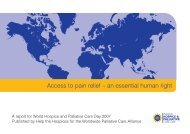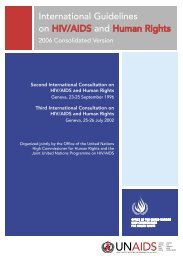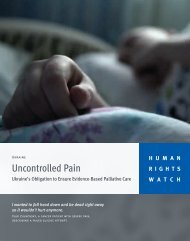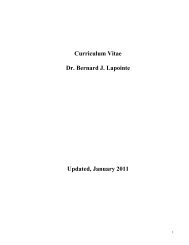INTERIGHTS Bulletin
INTERIGHTS Bulletin
INTERIGHTS Bulletin
Create successful ePaper yourself
Turn your PDF publications into a flip-book with our unique Google optimized e-Paper software.
<strong>INTERIGHTS</strong> <strong>Bulletin</strong><br />
Volume 16 Number 4 2011<br />
173<br />
different types of suffering of different<br />
origins to potentially constitute torture<br />
or ill-treatment. For example, the<br />
European Court of Human Rights<br />
(ECtHR) has accepted that suffering<br />
due to the military burning someone’s<br />
house; 11 a failure to protect someone<br />
from environmental pollution; 12 a<br />
failure by a government to adequately<br />
investigate a reported disappearance; 13<br />
a failure to protect someone from<br />
domestic violence; 14 and a failure to<br />
address mistreatment and neglect of<br />
children by their parents 15 can all give<br />
rise to a violation of the prohibition of<br />
torture or ill-treatment.<br />
The Committee against Torture, an<br />
independent body that monitors the<br />
implementation of the Convention<br />
against Torture and Other Cruel,<br />
Inhuman or Degrading Treatment or<br />
Punishment, has stated that member<br />
states must prevent torture and illtreatment<br />
in ‘all context of custody or<br />
control…as well as contexts where the<br />
failure of the State to intervene<br />
encourages and enhances the danger<br />
of privately inflicted harm.’ 16<br />
The UN Special Rapporteur on<br />
Torture, Cruel, Inhuman or Degrading<br />
Treatment or Punishment has<br />
specifically addressed the issue of pain<br />
treatment and argued that denial of<br />
such treatment can constitute torture<br />
and ill-treatment. In a 2009 report to<br />
the Human Rights Council, Professor<br />
Manfred Nowak, the then-rapporteur,<br />
specified that, in his expert opinion,<br />
‘the de facto denial of access to pain<br />
relief, if it causes severe pain and<br />
suffering, constitutes cruel, inhuman<br />
or degrading treatment or<br />
punishment.’ 17<br />
Minimum Level of Severity<br />
The next question to examine is<br />
whether the suffering caused by<br />
untreated pain meets the required<br />
minimum level of severity, which most<br />
international human rights<br />
mechanisms use, to qualify as torture<br />
or ill-treatment. This determination is<br />
made on a case-by-case basis. The<br />
ECtHR, for example, has held that ‘the<br />
assessment of this minimum is, in the<br />
nature of things, relative; it depends on<br />
all circumstances of the case, such as<br />
the duration of the treatment, its<br />
physical or mental effects and, in some<br />
cases, the sex, age and state of health of<br />
the victim.’ 18<br />
As Artur’s case clearly shows, the<br />
physical and mental suffering of<br />
persons with untreated pain can, like<br />
that of victims of traditional forms of<br />
torture and ill-treatment, be very<br />
severe:<br />
Physical Suffering: Not only can pain<br />
due to cancer or other illnesses be very<br />
severe, it often extends to many parts<br />
of the body, may be constant and<br />
without reprieve, and can last over long<br />
periods of time. Experts estimate that,<br />
on average, a person dying of cancer or<br />
AIDS will suffer from moderate to<br />
severe pain for a period of three<br />
months, far longer than most victims<br />
of traditional forms of torture or illtreatment<br />
are subjected to abuse. 19 In<br />
interviews with Human Rights Watch<br />
in half a dozen countries around the<br />
world, people with severe pain often<br />
expressed a sentiment similar to that<br />
of traditional torture victims: They<br />
would do anything to stop the pain. 20<br />
We have documented numerous cases<br />
of suicidal ideation among such<br />
patients, as well as various cases of<br />
suicides and attempted suicides.<br />
Mental suffering: Severe pain causes<br />
significant mental suffering. Patients<br />
often experience a profound sense of<br />
loss of control, fear, anxiety and<br />
isolation. Severe pain tends to render<br />
patients bedridden and incapable of<br />
being active or even making decisions<br />
about their own lives. Frequently, they<br />
become completely dependent on<br />
relatives while at the same time being<br />
unable to interact with them in a<br />
meaningful way. Human Rights Watch<br />
interviewed various patients who said<br />
that they could no longer tolerate<br />
having their children around them or<br />
became abusive to their spouses as a<br />
result of the pain. Finally, pain<br />
frequently causes acute sleep<br />
deprivation that builds over time and<br />
has a profound impact on patients’<br />
mental state. 21 According to a WHO<br />
study, people who live with chronic<br />
pain are four times more likely to<br />
suffer from depression or anxiety than<br />
people who do not have chronic<br />
pain. 22<br />
Long-term consequences: Finally,<br />
untreated pain can have serious longterm<br />
consequences for patients.<br />
According to WHO, the physical effect<br />
of pain can influence the course of the<br />
diseases and even result in death. 23<br />
Pain frequently causes immobility,<br />
which can result in permanent loss of<br />
function in patients. 24<br />
It is important to keep in mind that a<br />
certain degree of suffering, both<br />
physical and mental, is inherent in<br />
having a life-threatening disease like<br />
cancer. In assessing whether the<br />
minimum level of severity is met, one<br />
therefore needs to examine not the<br />
totality of the patient’s suffering but<br />
the severity of the suffering that may<br />
not be regarded as inevitably<br />
experienced by a person with a serious,<br />
life-threatening health condition. 25<br />
The question is the extent to which the<br />
lack of treatment for severe pain<br />
unnecessarily prolonged or<br />
exacerbated the suffering.<br />
Torture or Ill-Treatment<br />
A subsequent question is whether<br />
denial of pain treatment would qualify<br />
as torture or ill-treatment. Schweitzer<br />
uses the word torture to convey the<br />
severity of the suffering of patients.<br />
But in a legal sense torture requires<br />
intent to cause severe suffering and<br />
state officials must be directly or<br />
indirectly responsible for inflicting the<br />
suffering. 26 Typically, however, denial<br />
of pain treatment results from neglect,<br />
poor government policies, and a lack of<br />
knowledge, rather than from an<br />
intention to inflict suffering and would<br />
therefore constitute ill-treatment and<br />
not torture. Theoretically, of course, a<br />
healthcare worker or official who<br />
deliberately withholds treatment from<br />
someone in severe pain with the intent<br />
to cause severe suffering could be<br />
guilty of torture but this is not a<br />
situation we have come across in our<br />
work. 27<br />
The Scope of the Positive Obligation
















